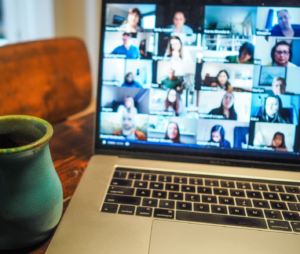When You Have a Disability, Virtual Friendships Can Be Special
by Alicia
 When we think about how COVID has changed the way we live our lives, we think a lot about mask mandates, vaccines, and Zoom meetings. We think about in-person jobs switching to remote or hybrid. Unfortunately, a conversation about how it affects people with disabilities isn’t too common.
When we think about how COVID has changed the way we live our lives, we think a lot about mask mandates, vaccines, and Zoom meetings. We think about in-person jobs switching to remote or hybrid. Unfortunately, a conversation about how it affects people with disabilities isn’t too common.
It should be.
I’ve heard from friends that they’re paying a lot more in ridesharing fares. I’m thankful I haven’t noticed a spike, but that could very well be location-based.
Many of my friends are actually struggling with the job search. Yes, a lot of things have gone remote, but a lot of remote jobs are requiring the completion of assessments, and a lot of these end up being inaccessible. Friends who are looking out of state are struggling with residency requirements to qualify.
Another issue? The lack of social interaction. You may think the lack of social interaction isn’t as big of an issue as it was two years ago, when COVID was at its peak, but I’ve noticed it myself lately and have talked with friends who feel it, too.
And these friends I’m talking about? They aren’t just the ones that I’m lucky enough to know personally. I also have some good friends I’ve actually never met in person.
Times have changed, and with that time comes our change in beliefs. “Don’t talk to strangers on the internet” has evolved into dating apps, Facebook groups, and virtual events. And two out of the three of those things is how I met some of the closest friends I have. I met them virtually through other friends, but we’ve never met in person. But I feel as close to these online friends as I do to the friends I know in person.
I met one person when she sent me a friend request in the summer of 2019. It turned out we had a lot of mutual friends, and people that I knew quite well, so I accepted.
I met another through interacting on another person’s Facebook page, so she added me (I guess she liked my personality), and now we have regular movie nights together over FaceTime.
To keep myself busy in the summer of 2020, I joined a virtual writing workshop. I already knew one participant — I went to college with her — but most of the writers in class were people I’d never met. I clicked with one of them, and we text almost every day and often send each other good music.
I don’t think of these people as “friends I’ve met on the internet.” I just think of them as just that — my friends. If someone were to ask me how I met them, I wouldn’t lie about it, but the fact of the matter is, I feel as connected to them as I do to the friends I made in person before COVID. I fully intend to meet every single one of these new friends in person someday.
In the meantime, we connect during movie nights, share music, and bond over true crime podcasts and videos. We’re also there for each other during the tough stuff. I stayed on the phone with one of them late one night last year while we were both having relationship problems, so we talked each other through it.
Virtual friendships have helped me make it through the COVID years. During the open, honest, vulnerable conversations, we discussed many of the same things you’d talk about with a close friend face-to-face, or on the phone if you can’t see them in person. The only difference is that I’ve never met them in person. We connected through friends I know quite well, and these people have good character, and that’s all I care about.
As we progress through life and times change, we need to normalize virtual friendships rather than question their value. In a world that focuses so highly on the internet, it’s almost expected that at some point, you’ll make friends online. That’s okay and should be acceptable.
For me, the old warning “Don’t talk to strangers on the internet” has evolved into doing just that, and meeting some of the greatest and most influential people I could ask for.






